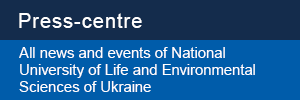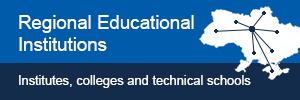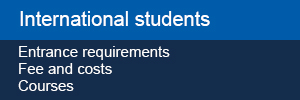Curriculum Components
1.GENERAL TRAINING CYCLE
Compulsory components
Oral speech Technique. The course aims to acquaint students with the basic requirements and specific features of oral journalistic message and on-air speech, to form skills of non-verbal means of expression, competent intonation of the message of the logical and emotional speech components at the microphone.
Modern Ukrainian language in media. The course is aimed at forming students’ holistic view of the development of the Ukrainian language and its originaliity; studying spelling rules and modern elocution; acquainting with scientific concepts of studying the codification of language standards; developing skills and abilities to use phonetic means of speech, standard speech, spelling rules; developing practical skills of word use, creation of grammatical forms observing current standards of the modern Ukrainian literary language; analysing syntactic categories and syntactic units, as well as improving punctuation skills keeping to literary standards.
Latin. Providing knowledge of the basics of Latin, developing skills and abilities to translatie Latin texts and use Latin terminology in academic, scientific and production activities.
Informationl law. Information law as an independent branch of legal science in the context of human rights and freedoms and in the imlplementation of European standards in modern media. The concept of civil law of Ukraine, its subject and methods of legal regulation. Sources of Information and Civil Law of Ukraine. Trends in the development of civil legislation of Ukraine. Concept, classification, content and the grounds for the emergence and termination of civil legal relations. Subjects and objects of civil legal relations, their types. Features and procedures for the exercise and protection of civil rights and duties. Concepts and types of juristic acts.
Foreign language (for specific purposes). The course develops students’ communicative competency, in particular the use of foreign language knowledge and skills during business communication with representatives of other countries on various issues concerning business and labor market in agriculture, preparing for participation in international conferences, projects and discussions as well as making presentations, dealing with business correspondence (formal and informal letters, CVs, various kinds of research articles and reports), in such way contributing to versatile development of student’s personality and his/her socialization in a foreign language community.
Basics of the scientific research. Principles and methods of organization and implementation of scientific research. General requirements for the execution of scientific research. Ability to work with scientific sources.
Contemporary Ukrainian literature and literary critique. This course offers a survey of selected phenomena in contemporary Ukrainian literature. The course examines works in different genres – poetry, drama, and prose – but mostly concentrates on works of long prose and literary critique. Readings will include a number of trend-setting works and a few that have become classics.
Ukrainian and world culture. Culture of primitive time. Culture from the Ancient East to the Enlightenment times. European culture of the XIXth and XXth centuries. Culture of Kievan Rus. Ukrainian culture of the Lithuanian-Polish period (XIVth – first half of the XVIIth century). Culture of Ukraine from the second half of the XVIIth century. to the beginning of the XXth century. Culture of Ukraine in 1917 – the first half of the 1940s.
Practical stylistics. Theoretical basis of stylistics, topical problems of modern science; stylistic standards of the Ukrainian language.
Compulsory components of the EPP by decision of the University Academic Council
History of Ukrainian statehood. The content of "History of Ukrainian Statehood" academic discipline is studying basic stages of formation and development of statehood on the Ukrainian lands, and distinctive state building way of the Ukrainian nation. Development of the independent state requires highly skilled, patriotically inclined, socially oriented professionals able to continue the best traditions of the Ukrainians. The response to these circumstances is the study of this discipline in universities. Іt will allow students to master the theoretical course, creatively apply their knowledge in practice and comprehend on their own laws of the state building process, be better versed in social and political life and feel their involvement in the thousand-year-old state-building traditions of the Ukrainian people.
Foreign language. A set of concepts and terms that make up a wide vocabulary, as well as speech, grammar and syntax rules, rules and principles of organizing appropriate oral and written communication, using an extensive vocabulary.
Physical education. The aim of the discipline is formation of students’ physical culture and their ability to realize it in the process of social and professional training and in family life. The objectives of the discipline are to improve students’ health and develop physical abilities in accordance with their future professional activity.
Philosophy and logic. The course provides the system of knowledge in such branches of philosophy as ontology, gnoseology, social philosophy, historical types of philosophy that explain the essence of relations “a human being – the world” in its main manifestations. The course is marked by a worldview orientation, which allows for synthesizing knowledge acquired in studying professional and humanities disciplines into a holistic worldview - the theoretical basis of the university level of training. The method of logic, the main forms and laws of thinking, prerequisites of the origin of current logic, the division of classical logic, typology and analysis of formal and logical theories within the logics of dictum and the logics of predicates.
Life safety. General principles of occurrence and evolution of hazards and emergencies. Their properties and possible impact on human life and health. Life safety in emergency situations. Organization and management of life safety. Labor protection Legislation. Fundamentals of occupational hygiene and industrial sanitation. Providing the first medical aid. Ensuring healthy working conditions in the national economy.
2. SPECIAL (PROFESSIONAL) TRAINING CYCLE
Compulsory components of the EPP
Introduction to speciality (Fundamentals of journalism). The modern system of world and Ukrainian information markets. The theory of press functioning (the interaction of the press and authorities, the press and society). Basic functions and principles of journalism. Methods of collecting information. Characteristics of genres and genre system of modern press. Theoretical principles of journalism. It’s difference from the artistic creativity type, as well as features of different types of journalism. History of journalism development in Ukraine. The role of the media in a democratic society. Media ethics, journalist’s code of professional conduct, his social responsibility. Organization of editorial and publishing work in journalism.
Mass communication theory. Mass communication theory is the first fundamental-professional discipline that studies the functions of communication, its role and place in the life of society, the natural channels of information transmission, influence methods through different sign systems, the state of modern mass media development, and directs for conducting media research, critical thinking, understnding the problems of the national information space and issues of Ukraine's joining the international information space. Communicative activity. Communication models. Typology of communicative effects. Criteria for effective communication. Structuring information as a condition for communication effectiveness. Information comfort. Types and forms of communications technology.
New media. This course interrogates the impact of digital technologies on individuals and society and provides students with the skills and knowledge to be able to think critically and creatively about new media. Students will learn about diverse digital media techniques and processes, including coding and hacking, web design, animation, digital ethnography and more. Through a hands-on approach, student will gain an understanding of the social, cultural and economic roles of new media, and explore what it is like to work in the new media industries.
Culture of broadcasting. Functions and features of broadcasting. Knowledge of orphoetic, accentuation and lexical standards of the modern Ukrainian literary language. Requirements for journalist’s work on the air. Broadcasting technique. Development of phonation breathing, articulation, speech accent, and elocution skills.
Journalism ethics. Fundamental principles of the journalistic profession. Requirements for information delivery: efficiency, accuracy, completeness, balance of opinions and variety of viewpoints, separation of facts from comments and evaluations, veracity, simplicity. Journalism ethics as a specific branch of professional ethics. Sources of journalism ethics. Journalist's moral consciousness and standpoint. Categories of journalism ethics. Ethical values and ethical standards of the journalist. Information rights of a journalist. Journalist's professional activity and person’s private life. Journalistic activity and informational and psychological safety of society. Corrupt media practices. Journalist’s network ethics. The ethics of controversy and criticism in the media. The ethics of advertising in the media. Journalistic etiquette.
Journalism theory. Basic concepts in the field of journalism. Methodological features of the specialty. Fundamentals of professional ethics and journalism genre studies. Legal principles of communicative activity. Journalism methodology. Types and rules of collecting information. Contemporary philosophical concepts, the subject of which is journalism.
Audiovisual production. The course prepares students for creating different kinds of audiovisual media, such as interactive media and films. This course focuses on audiovisual theory and practice with classes such as documentation and audiovisual communication, digital culture, analysis of image significance and audiovisual production. It also gives students the technical knowledge needed to be involved in both the creation and dissemination of audiovisual media.
Radio journalism and podcasting. Specificity of broadcasting, its functionality and place in the media system. Principles of radio journalist's activities. Genre-stylistic spectrum of radio journalism. Features of interaction with radio audience. Technologies for creating high-quality software radio products.
History of Ukrainian and world journalism. Periodization of the journalism formation on Ukrainian lands. Information about the main personalities, individual periods, their works. Trends in the press system development. Features of the journalism development. Features of press edition evolution from initial prototypes to modern form. History of journalism of the XVIIth – XIXth centuries. National features of foreign journalism. European journalism of the XXth century.
Literary editing. Basic concepts of "Literary editing" course; literary editing and text style; genre text form; linguistic standard and variances; text segmentation and literary editing; clarity of the text; verbalization of the emotional in the text; literary editing of text elements.
TV Journalism. Phenomenology of television - evolution, functions, specifics. Genres system of modern television. Main directions of modern TV production in Ukraine and in the world. European standards for information broadcasting. Technology for creating a television story. Information package and its structure.
Information genres in journalism. Principles and functions of mass media activities; the most important state-building aspects of mass communication functioning in Ukraine; main principles of journalist's creative process; criteria for dividing journalistic works into genres; purpose, genre features, varieties of information genres; basic requirements for materials of information genres; factors of mass media influence on creationing and establishing the Ukrainian information space; the most important aspects of promoting the essence of the Ukrainian national state building idea and forming people's sense of patriotism, national dignity, and civic courage by means of mass media.
Media regulation. Legal bases of mass communication. International documents on the protection of human rights and freedoms. Activities of international organizations on mass media functioning, journalists' rights and freedom. Legal principles of mass media activity and development of information space of Ukraine. Domestic legislation on legal regulation of mass media. Activities of state authorities on meeting the society’s information needs and developing the information sphere in Ukraine. Freedom of speech in Ukraine: state, problems, prospects of development.
Theory of journalistic work and text. Linguistic personality, artistic image and author’s image. The main features of journalistic work. Journalistic work composition. Genre types of journalistic creativity.
Analytical journalism. Formation and professionalism components. The traditional system of journalistic genres and the modern classification of analytic genres. Review, news item, article, letter, modern genres.
Converged media. Trends in the development of genre system of modern journalism. Internet journalism as a new kind of journalism. Offline and online media: common and diverse. Content types. Multimedia genres. Multimedia formats. Formation of information content for online media.
Optional components
Optional components by specialty (block 1) Media technologies
Data journalism. The course is aimed at students’ mastering theoretical knowledge, practical skills and competencies, allowing for effective search, analysis and processing of large data sets in order to present the material in the form of media text, infographics, and visualization.
Web design and html programming. Web structure and principles. Introduction to client-server Web technologies. HTTP protocol. Client scripts and applications. Server web applications. JavaScript. Scripting languages Perl, PHP, JSP. Development of CGI-applications on Perl, PHP, JSP. Basics of developing web applications using PHP. Interfaces of interaction of web applications with DBMS. Web services and languages for their description. XML basics. Web content development. CMS / CMF. AJAX technology. Web design.
Multimedia products. Multimedia genres. Multimedia formats. Formation of information content for online media. Features, methods and techniques of creating multimedia news, reports and interviews. Technologies for creating publications for different media platforms. Media product promotion. Basics of using with multimedia equipment.
Communication technologies. Communicative activity. Communication models. Typology of communicative effects. Effective communication criteria. Structuring information as a condition for effective communication. Information comfort. Types and forms of communication technologies.
Digital humanities. The course is aimed at acquainting students with the theoretical foundations and forming practical skills of using digital technologies in social communications, in particular for text analysis, data digitization, digital data storage, applying three-dimensional modeling technology, visualization of sociocultural processes, digital technology impact on humans.
Online journalism. This course will develop and expand the understanding of journalism as a global industry. Students will learn best practices and ethical standards for news collection and news reporting processes through practical projects, feedback from peer developers, and questionnaire studies. Students will also study the impact of journalism on societal issues and trends, as well as career opportunities in social media and online multimedia.
Media management. The course will enable students to identify and analyze strategic and operational problems and possibilities in media management, understand media functioning in national and international media markets, and use foresight and planning techniques to understand and respond to change. In addition to being able to manage complex media projects, students will also have the skills to engage in strategic direction setting, deploy business-planning skills, and excel in leadership.
PR-technologies in the media. The course is aimed at studying the nature of modern PR-technologies, current state of their development and the benefits created by relevant technologies; mastering the methods of basic forms of PR tools practical use; covering the impact of PR system application on creating company’s success; forming students' holistic view of the mechanisms of strategic and operational company planning, taking into account the use of PR-technologies.
Optional components by specialty (block 2) Media communications
Investigative journalism. Place and role of investigative journalism in modern journalism. Specifics of journalistic investigation. The essence and basic requirements for an investigative journalist’s work. Varieties of journalistic investigations. Technology of journalistic investigation. Methods of constructing composition and stylistics of the investigation report before publishing, logical motivation of the stated facts, dealing with figurative tools. Legal and ethical requirements for an investigative journalist’s work.
Journalist safety. Risk factors and safety of journalist's activity. Emergencies of natural, industry-related and anthropogenic nature. The extent and nature of their danger to a journalist working in a disaster area. Investigative journalism and journalist’s personal safety. Journalist’s personal safety during mass events, in fighting and armed conflict zones, and under conditions of emergency. Journalist’s personal safety while working in zones of mass riots and clashes. Manifestations of unmotivated violence, aggression and basic measures of journalist’s personal safety. Danger of assassination, terror attack, robbery, physical attack in journalist’s work. Legal field of journalist's activity (financial risks, lawsuits, secrecy, etc.). Physical and psychological overload, stress, fatigue.
Advertising and PR. Advertising: concept, function, purpose and types. Non-verbal means of creating promotional text. Psychological technologies of advertising on different data media. Advertiser’s psychology. Psychology of attitude to advertising. Basic processes of PR. Features of PR in a business organization. Crisis PR. International PR. Technique for writing and giving speeches. PR know how.
Visual Communication. Visual communication course focuses on communication through visual aids. The diverse field of visual communication includes drawing, animation and multimedia, sketching, advertising, graphic designing, video editing, photography, production of audiovisual products.
Media analysis and media psychology. The course offers an introduction to the ideology, rhetoric and modes of address adopted by the media, and emphasises appropriate analytic strategies for encountering various media genres and formats. Attention is particularly paid to visual culture, demonstrating how fiction, fact and everyday imagery operate in audiovisual as well as textual contexts, across different platforms.
Media criticism. History of the establishment and development of media criticism as a special field of journalism in Ukraine and abroad. Forms and genres of works of national media criticism. Functions of media criticism, their correlation with the basic functions of journalism. Specialized editions, sites, web pages.
Imageology. The course is aimed at obtaining systematic knowledge about the scientific basis of imageology theory; acquainting with the mechanisms of image making at different levels (individual, subject, corporate, etc.); formation of ideas about image functions in various aspects, which are implemented in socio-cultural practices; mastering modern image maker’s skills to create company/corporation image from the human factor perspective.
Marketing and political communications. This course offers students a systematic description and analysis of basic concepts, theories and activities associated with these types of communication.





